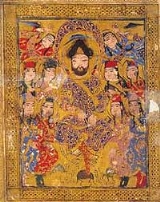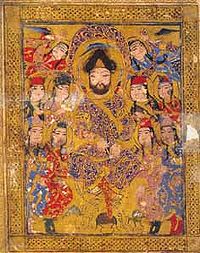
Kitab al-Aghani
Encyclopedia

Kitab al-aghani is an encyclopedic collection of poems and songs that runs to over 20 volumes in modern editions by the 8th/9th-century litterateur Abu l-Faraj al-Isfahani (var. al-Isbahani). Abu l-Faraj claimed to have taken 50 years in writing the work, which ran to over 10 000 pages. It can be seen as having three distinct sections: the first dealing with the '100 Best Songs' chosen for the caliph Harun al-Rashid
Harun al-Rashid
Hārūn al-Rashīd was the fifth Arab Abbasid Caliph in Iraq. He was born in Rey, Iran, close to modern Tehran. His birth date remains a point of discussion, though, as various sources give the dates from 763 to 766)....
, the second with royal composers and the third with songs chosen by the author himself. It spans the period from the Jahiliyya to the end of the 9th century CE. Abu l-Faraj importantly included performance directions for many of the songs included in Kitab al-aghani though while these shed valuable light on Arabic musical practice at the time they are largely meaningless for a modern-day audience. Due to the accompanying biographical annotations on the personages in Kitab al-aghani the work is an important historical and literary historical source; it is also useful for those interested in the sociology of Arabic literature. Much work has been done in recent years on Kitab al-aghani by, among others, Hilary Kilpatrick, whose book Making the Great Book of Songs is of particular value to the serious student of Arabic literature and literary history.
See also
- Abu al-Faraj al-Isfahani
- List of Arab scientists and scholars
- Imru' al-QaisImru' al-QaisImru` al-Qais bin Hujr al-Kindi was an Arabian poet in the 6th century AD, and also the son of one of the last Kindite kings. His qaseeda, or long poem, "Let us stop and weep" is one of the seven Mu'allaqat, poems prized as the best examples of pre-Islamic Arabian verse...
- Maqamat (literature)

